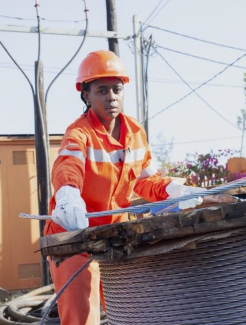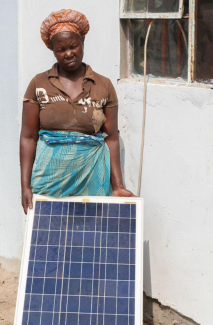USAID supported the development and drafting of the new law
Outside of the cities, only one out of every twenty Mozambicans have access to electric power. The countryside literally sits in the dark after sunset. Change is coming, however: a new law will allow private investment in decentralized mini-grids, opening up access to low-cost renewable power sources and ending decades of mandatory state participation in energy generation and distribution.
Lack of access to electricity impacts the daily lives and livelihoods of millions of Mozambicans. Albertina José, a widow with four children lives in rural Xiboeni, Mozambique, an area off the national grid. She runs a small shop from her home and says she faces many constraints due to lack of electricity.
“For lighting we use poor quality solar panels. On rainy days we spend a long time in darkness. It is very costly and impossible to keep fresh products.”
Studies show that households without electricity achieve lower levels of education, face increased respiratory health risks from home cooking fires, and have limited earnings potential due to low economic productivity versus households with electricity.
To close this rural/urban (rural 4.5% vs. urban 75%) divide and electrify all Mozambican households by the Government of Mozambique’s (GRM) target of 2030 requires strategic on- and off-grid investments, legal/regulatory reform, private investment at scale, and a clear off-grid strategy. To address this challenge, USAID, through the SPEED Project and Power Africa, and in coordination with other development partners, provided the GRM with funding support for officials’ technical site visits and technical assistance to draft the recently approved Electricity Law. This new law is expected to accelerate access to energy for Mozambican families, largely by improving the enabling environment for private sector investment in power generation. That means that Albertina can carry more products in her store and make more income for her family while also contributing to better nutrition for her community.
A major constraint previously was the concession system, where the State controls the complete process, and all projects are organized with State participation in public-private partnerships (PPP). So, what are the changes in the new law that will contribute to this marked improvement?
- The law marks a significant change from the current concession system by allowing simplified licensing for mini-grid investments; under the current regime investors must follow the large-scale concession process (22 steps, $2 million, 3 years) subject to a strict PPP law, while the new law allows mini-grid projects of up to 10 megawatts (MW) capacity to obtain a simplified license that requires only three steps at one agency.
- State ownership in power investments is no longer mandatory and a new independent energy regulator, ARENE, will now be empowered to lead public procurement and tariff setting.
- Improved market competition will occur by unbundling the electricity market for service providers, grid operators, and system operators, which will lead to market efficiency and lower costs for electricity access
Off-grid power investors have long seen the low electrification rates in rural Mozambique (reaching 4.5% of the population) as an opportunity, since solar micro and mini-grids can provide electricity access in areas outside the central power grid. While the potential for climate-friendly off-grid electrification in the country is immense, the former costly and complex investment regime kept most investors on the sidelines. During the public consultation period, off-grid investors in Southern Africa repeatedly contacted SPEED to express their interest in the new law.
The Electricity Law provides a case study in working with the government to open new opportunities for private investment in sectors currently dominated by the state. And, while the effort faced delays and challenges along the way, relationship building by USAID SPEED’s staff and the government’s commitment to achieve ambitious electrification targets have resulted in a policy reform that promises to impact the lives of Mozambicans like Albertina and others like her, for decades to come.

USAID/SPEED

